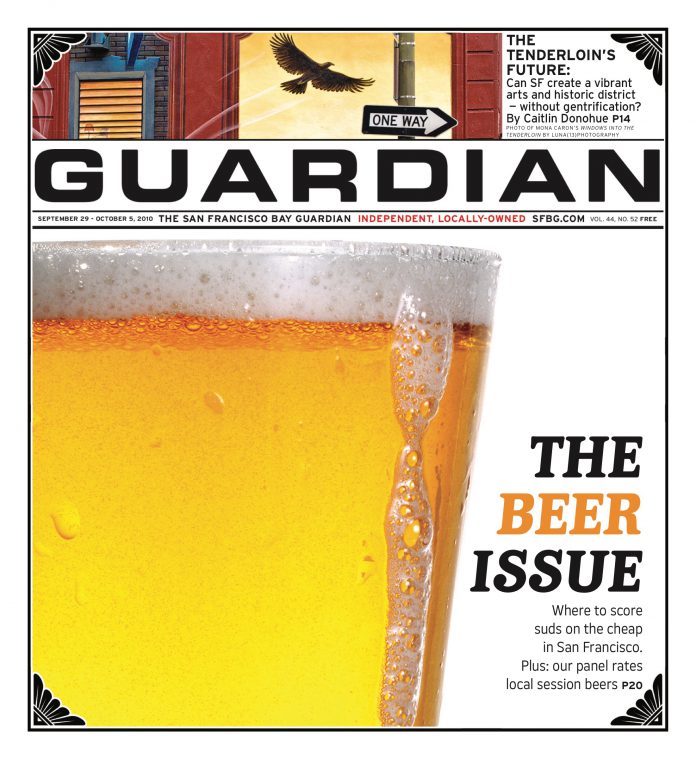arts@sfbg.com
STAGE Ogun Size has shaped up into a complex, intriguing character across the first two plays staged so far in the Bay Area debut of Terrell Alvin McCraney’s The Brother/Sister Plays. The Magic Theater last week opened The Brothers Size, the second play in the celebrated trilogy, in an electric production sharply directed by Octavio Solis. Its choice minimalism (including a spare but evocative car garage set from scenic designer James Faerron and scenic/lighting designer Sarah Sidman) gives just the right lift to three fine, exuberant performances and full rein to the 20-something playwright’s delicate, volatile drama set in and around a Louisiana bayou housing project.
Ogun is an important but secondary character in the first play, In the Red and Brown Water (now up at Marin Theater Company, as part of an unprecedented three-company production that includes an offering by ACT in late October). That play focuses instead on his onetime love, Oya. Her dire fate gets alluded to in passing here, with understated pain, as Ogun (played by the impressively dynamic Joshua Elijah Reese) recounts neighborhood news to brother Oshoosi (a vital and wry Tobie Windham). Recently paroled, the excitable, silver-voiced, and perennially irresponsible Oshoosi is very reluctantly working alongside (and under the wary eye of) his older brother in the latter’s automotive repair shop.
Ogun’s wary eye soon also falls on Elegba (played with a magnetic, mercurial charm by a terrific Alex Ubokudom), the third and final character in a coiled little story of love, loyalty, jealousy, and desire that teases meaning from notions of brotherhood while brooding on the inevitable singularity and alienation at the heart of life. Elegba was already deemed complex by Oya in the first play, but here he is both more lifelike and ethereal, grounded in an almost preternatural obsession to have and control his former prison mate, Oshoosi. The jealous battle for Oshoosi that ensues is alternately boisterous, eerie, and wrenching. In the end, we watch Ogun Size grow larger — an expanse of feeling that increases the capacity of a heart bereft but open — as he finds himself, per force, alone again. Expanding like the universe itself, Ogun’s fate makes the infinity of his love still larger.
GOING OUT TO PLAY
A friend and I went to a restaurant the other day, and while it’s always a little like being in a play, this was ridiculous — also stimulating, and even quietly ecstatic. I won’t give you the intimate, somewhat bizarre details of our half-hour interaction. Not because it’s private, but because it’s up for grabs: you can have it yourself if you want, exactly as we did.
True, it was never going to be an ordinary lunch. We expected something unusual since, although we entered a real San Francisco eatery, it wasn’t a meal we were after but a performance, designed by the London-based experimental troupe Rotozaza. Etiquette, which runs through this weekend courtesy of Yerba Buena Center for the Arts, is participatory theater approaching some sort of outer limit: the audience goes Ark-like by twos (you can be paired up with another bewildered stranger or go with a friend) and performs the piece for one another. This takes place amid a roomful of unwitting patrons there strictly for the usual, namely a meal.
The first thing you notice is that this table doesn’t come with a menu, not even a bar list. There’s a glass of water, but you’ll hesitate to touch it. Instructions come via headsets. There are other intricacies best not revealed here, but as the encounter unfolds you find the lines between theater and "real life" dissolving, and your identity softening at the edges like a once-crusty crouton atop a bowl of soup. Meanwhile, the headphones, the concentration of your partner, the voice in your ear, the world of the tabletop, the knowledge that you are in a play, watching a play, and that, hell, you are the play — all this makes it surprisingly easy to shrug off any inhibition you might otherwise feel about making a "scene" in a restaurant.
The scene is your own in that you inhabit it, but then it is also dictated to you, bound by certain constraints. This tension is part of the delight generated by the piece. The audience-member-as-performer accepts, just as any actor does, the work of the playwright and instructions of the director. Within that there is room for individual choice and interpretation, but any action or decision comes circumscribed by the larger form. Day-to-day we all play our parts, of course, more or less self-consciously. But I never realized what a relief it might be to have your everyday encounters literally scripted for you. I suddenly thought I knew why pirates have parrots on their shoulders. I’d naively assumed it was the man feeding lines to the bird.
While Etiquette‘s parts are gender-specific, the participants might be of any sex, no matter the role. In fact, the idea of liberation from ascribed roles comes woven, in subtly layered fashion, into the very narratives unfolding and overlapping across the table. If the foundation of identity relies on the cultural and social forms we inherit, how liberating it is, even momentarily, to sit down in public and embrace play in all its forms.
THE BROTHERS SIZE
Through Oct. 17, $20–$60
Magic Theatre
Fort Mason Center, Bldg D, SF
(415) 441-8822
ETIQUETTE
Through Oct. 3, $8–$10
Yerba Buena Center for the Arts
701 Mission, SF
(415) 978-2787

